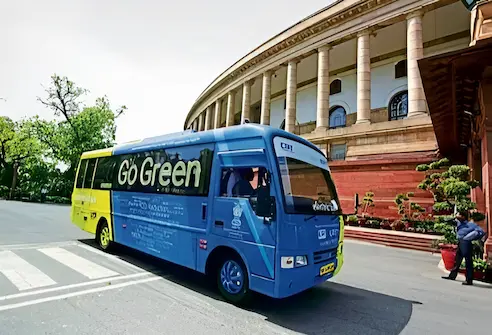
PM Modi flags off 200 electric buses in Delhi under the DEVI scheme, promoting green mobility and last-mile connectivity
On World Environment Day, Prime Minister Narendra Modi launched 200 electric buses in Delhi under the Delhi Electric Vehicle Interchanges (DEVI) scheme. This initiative aims to enhance last-mile connectivity, reduce carbon emissions, and promote sustainable urban transport. The buses, designed for narrow lanes, will operate across key routes, offering a cleaner and more efficient commuting experience.
Table of Contents
A Step Towards Sustainable Public Transport
The DEVI scheme is a major milestone in India’s green mobility efforts. These 9-meter-long electric buses are equipped with advanced battery technology, allowing them to travel over 200 km on a single charge. With zero emissions, they contribute to Delhi’s fight against air pollution, a persistent challenge for the capital.
Key Features of the DEVI Electric Buses
- Compact Design: Ideal for narrow roads and congested areas.
- Eco-Friendly: Zero-emission technology reduces carbon footprint.
- Fast Charging: 45-minute charging cycle ensures efficient operations.
- Passenger Comfort: Air-conditioned interiors with reserved seats for women.
- Affordable Fare: Expected to align with Delhi’s existing AC bus fares.
PM Modi’s Vision for Green Mobility
During the flag-off ceremony, PM Modi emphasized the importance of sustainable urban transport. He highlighted that electric buses will play a crucial role in reducing pollution and enhancing connectivity in Delhi’s urban landscape.
“These buses are not just a mode of transport; they represent our commitment to a cleaner, greener future,” PM Modi stated.
Impact on Delhi’s Public Transport System
Delhi’s current fleet consists of over 7,400 buses, including CNG and electric models. However, the city requires 11,000 buses to meet growing commuter demands. The addition of 200 electric buses under the DEVI scheme is a significant step toward bridging this gap.
How These Buses Will Improve Connectivity
- Expanded Routes: Covering South Delhi, East Delhi, West Delhi, and Central Delhi.
- Last-Mile Access: Reaching areas with limited public transport options.
- Reduced Traffic Congestion: Encouraging public transport over private vehicles.
Public and Expert Reactions
Commuters Welcome the Initiative
Delhi residents have expressed optimism about the new electric buses. Many believe that cleaner transport options will improve air quality and reduce travel time.
Environmental Experts Applaud the Move
Environmentalists have hailed the DEVI scheme as a game-changer for Delhi’s pollution crisis. Dr. Rajesh Kumar, an urban transport expert, stated:
“Electric buses are the future. Delhi’s initiative sets a strong precedent for other cities to follow.”
Challenges and Future Prospects
While the launch of 200 electric buses is a positive step, experts stress the need for continued investment in green mobility. Key challenges include:
- Infrastructure Development: Expanding charging stations across the city.
- Fleet Expansion: Increasing the number of electric buses to meet demand.
- Policy Support: Strengthening government incentives for EV adoption.
Conclusion – 200 Electric Buses in Delhi
The flagging off of 200 electric buses under the DEVI scheme marks a significant leap toward sustainable urban transport in Delhi. As India moves toward a greener future, initiatives like these will play a pivotal role in reducing pollution and enhancing connectivity. With PM Modi’s vision driving the transition, Delhi is set to become a model city for electric mobility
Also read – Travel Ban by Trump: 12 Nations Face New Restrictions Amid Security Concerns